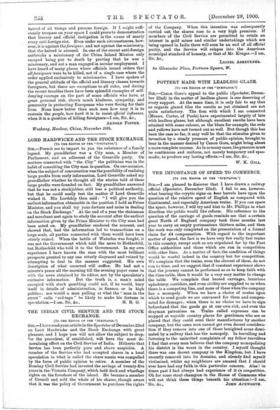THE INDIAN CIVIL SERVICE AND THE STOCK EXCHANGE.
[TO THE EDITOR OF THE "SrEcrArort..1 SIR,—I have read your article in the Spectator of December 22nd on Lord Hardwicke and the Stock Exchange with great pleasure, and I hope you will not allow the subject to drop, or the precedent, if established, will have the most de- noralising effect on the Civil Service of India. Hitherto that Service has been perfectly pure and above suspicion. A member of the Service who had accepted shares in a local speculation in what is called the share mania was compelled by the force of public opinion to retire. A member of the Bombay Civil Service had invested the savings of twenty-five years in the Victoria Company, which held dock and wharfage rights on the foreshore of the island. He became a member of Council and sold the whole of his shares, though aware that it was the policy of Government to purchase the rights
of the Company. When this intention was subsequently carried out the shares rose to a very high premium. If members of the Civil Service are permitted to retain an interest in gold mines and similar undertakings which are being opened in India there will soon be an end of all official purity, and the Service will relapse into the American municipal standard of honesty, or that of Mr. Kruger.—I am, Sir, &c., LIONEL ASHI3IIRNER.
9a Gloucester Place, Portman Square, W.


































 Previous page
Previous page